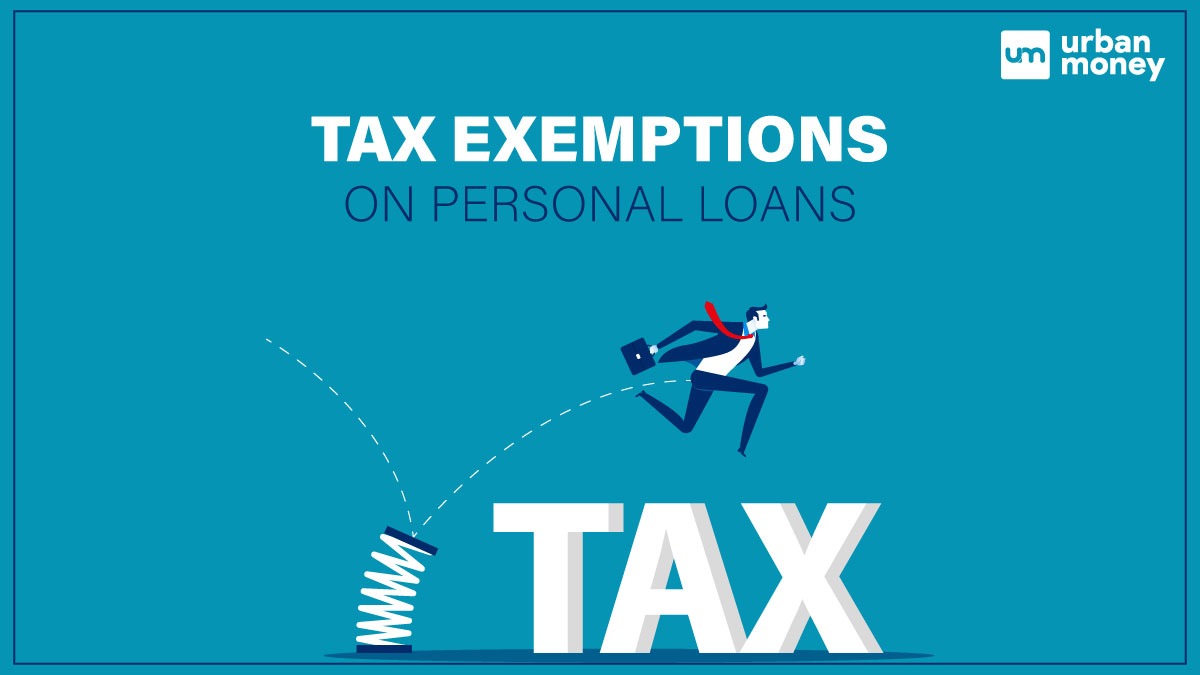Top 10 Best Private Banks in India List 2025
January 09, 2025
July 02, 2022


Time and again, personal loans have proven to be a reliable safety net for any financial need. The unsecured loans are easy to avail of with minimal eligibility criteria and a swift documentation process. The Income Tax Act 1961 does not consider personal loans as an income, so they are tax-free. Furthermore, personal loans are not eligible for exemptions and deductions. There are, however, some exceptions to this rule, which we have outlined below.
Throughout this blog, you will learn about the eligibility criteria, limitations, and tax benefits associated with personal loans. Keep reading to know more!
An important factor in determining tax liability for a personal loan is the source of funding. Personal loans are primarily not considered a part of your income. Hence, there is no tax owed on your personal loan. The above applies only if you have taken out a personal loan from a reputed bank or recognized NBFC. A personal loan from an unknown source (such as a family member or friend) is considered part of your income, and the government will levy taxes on it.
The Income Tax Act 1961 offers tax deductions and exemptions for loans that cater to certain purposes. Furthermore, as personal loans are unsecured in nature, the act does not establish any specific tax slab for them. Tax liability for personal loans is primarily determined according to the utilisation of the funds. In the following situations, personal loans are tax-exempt:
In accordance with section 24(b) of the Income Tax Act, 1961, an individual who obtains a personal loan for purchasing or constructing a house can enjoy tax benefits. A self-occupied house (i.e., a house you own and live in), will qualify for an exemption of up to Rs.2 lakhs. Rental or let-out properties are not subject to maximum limits.
If an individual takes out a personal loan for business purposes, the interest paid would be deductible as an expense. As a result, the business profits are deductible from the interest, which reduces the tax liability. This exemption is not capped.
Assets refer to shares, jewelry, non-residential properties, vehicles, etc. If a personal loan is raised for any such assets, the interest paid is added to the cost of acquiring the asset.
This deduction cannot be claimed in the same year as interest is paid but will be added to acquisition costs. Tax benefits can be reaped, when such assets are sold. Here, the deduction would be allowed only on the interest component of the personal loan.
Given below are some of the points that you should keep in mind while applying for a personal loan tax exemption:
The eligibility criteria for a personal loan depend on several parameters set by financial institutions. Check out the basic eligibility criteria laid down by the banks and NBFCs to avail of a personal loan:
Note: The eligibility criteria may differ from bank to bank
Age is the primary criterion for a personal loan. The minimum and maximum age laid down by the banks and NBFCs is usually 21 years and 65 years, respectively.
An individual must be a salaried employee with working experience of a minimum of 2 years or a self-employed individual with a minimum business vintage of 3-5 years.
The monthly income reflects the repayment capacity of the borrower. An applicant must earn a monthly income of at least INR 15,000 to be eligible for availing a personal loan.
The CIBIL score of an applicant illustrates his ability to repay. Hence every bank sets criteria of a minimum CIBIL score of 750 and above to avail of a personal loan.
Before applying for a personal loan, an applicant can check his eligibility by using the bank’s personal loan eligibility calculator. You must furnish basic details like current employment details, monthly income, monthly expenses, and age. After entering all the pertinent information, the calculator reveals whether you are eligible for the loan or not.
Note: The results displayed are hypothetical in nature. Banks do not take responsibility for the results generated by the calculator. If the applicant intends to apply for a personal loan, he must consult the bank.
CIBIL score is the primary criteria for any loan as it reflects the applicant’s credit history and repayment capacity. There are very slim chances for CIBIL defaulters to avail of a loan. There are high chances that the application might be rejected. However, you can still get loans with low CIBIL score but the interest charges might be comparatively higher
According to the Income Tax Act,1961 personal loans are not considered as a part of an individual's income and hence, there are no tax exemptions or deductions on the same.
If a personal loan has been availed of from a reputed bank or a recognized NBFC, it is not taxable. But, if you take a personal loan from an unrecognized source (i.e.. from your family or friends) it will be considered a part of your income and the government will levy taxes.
The Income Tax Act,1961 does not consider personal loan as income and hence there is no slab laid down in the act for the same.









Top 10 Best Private Banks in India List 2025
January 09, 2025

Top10 List of Petrol Pump Companies in India
January 09, 2025

Dairy Farm Loan in 2025 : Online Procedure
January 09, 2025

Top 10 Best Bank for Home Loan In India…
January 09, 2025

Top10 Best Student Credit Cards in India 2025
January 09, 2025
© 2025 www.urbanmoney.com. All rights reserved.

Need Loan Assistance?